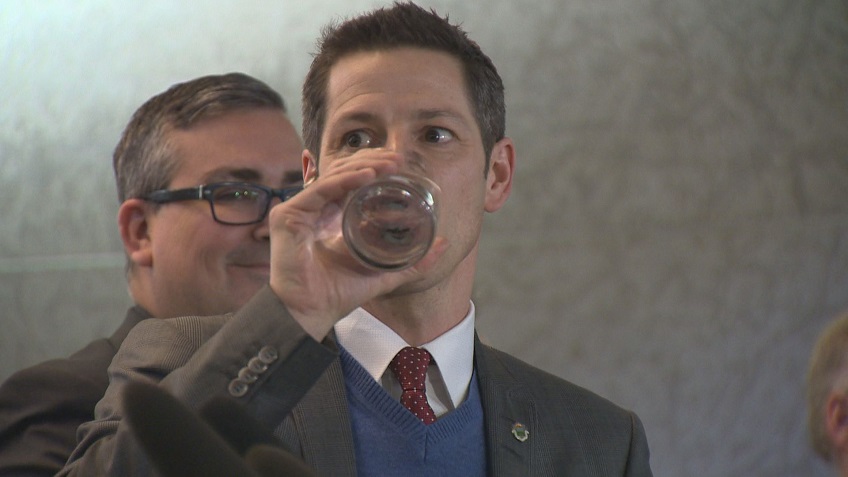WINNIPEG – Brian Bowman had barely unpacked his sports memorabilia and family photos in the mayor’s office when he was thrust into the national spotlight.

It wasn’t for being the first indigenous mayor of a major Canadian city or for being one of the younger municipal leaders in the country.
Winnipeg had just been called “the most racist in Canada” on the cover of Maclean’s magazine.
The new mayor was faced with a dilemma — defend his hometown or admit it has a problem.
READ MORE: Mayor breaks down during response to Winnipeg racism article
Within a few short hours in January, Bowman collected dozens of community, business and aboriginal leaders to stand behind him as he fought off his emotions and promised to fight racism.
“I knew when I was running for office that these were some of the challenges that we would have to face,” Bowman says now. “I want all Winnipegers to be proud of who they are.”
Bowman, 43, is part of a cohort of hip, western big-city mayors — including Naheed Nenshi of Calgary — who have risen to power on plans to rid the cobwebs from city hall and remake the level of government that is closest to the people.
- What is a halal mortgage? How interest-free home financing works in Canada
- Capital gains changes are ‘really fair,’ Freeland says, as doctors cry foul
- Ontario doctors offer solutions to help address shortage of family physicians
- Budget 2024 failed to spark ‘political reboot’ for Liberals, polling suggests
READ MORE: Bowman, Iveson, Nenshi, Robertson: A look at some of Canada’s western mayors
“I think there has been a wave from the West in Canada,” he says. “There’s a number of mayors that have brought in what I call new-generation leadership. It’s really looking at a new way of thinking — long-term, more pragmatic, open and accessible and a little bit more technology literate.”
As a lawyer with a background in privacy law and social media, Bowman has hired a social media director and has started live-streaming city hall meetings and news conferences. When a boil-water advisory turned off taps across Winnipeg for two days earlier this year, the announcement that it had ended came first on YouTube and Twitter.
“I use it to listen, first and foremost and I also use it to be open and accessible to Winnipegers,” Bowman says of his fondness for social media.
He was low in the polls when the mayoral campaign began last year, looking like a long-shot to beat front-runner Judy Wasylycia-Leis, a former MP. But he swept to power in a sea of selfies and promises to make the inner workings of city hall transparent again.
READ MORE: Brian Bowman wins 2014 Winnipeg election
The fact that he was Canada’s first indigenous mayor came as a surprise to many, since he never emphasized his Metis ancestry during the campaign.
His honeymoon period was relatively short. The racist city story was followed by the boil-water advisory, when E. coli was found during routine testing. Further investigation suggested results were false positives.
Bowman ran afoul of businessman Mark Chipman — a man admired by many for bringing the Winnipeg Jets NHL team back to the city — when he implied that some of Chipman’s business development dealings with city hall were shady and “not cool.”
While Bowman announced a mayor’s indigenous advisory circle after the Maclean’s article, it took five months to appoint its members.
READ MORE: Winnipeg mayor names aboriginal advisory circle
Many are expecting more from him.
Leslie Spillitt, executive director of aboriginal organization Ka Ni Kanichihk, says it’s not enough to just be an indigenous mayor or have an advisory council.
“If he’s got appointments to make in terms of community affairs, I would think he ought to be considering indigenous people,” she says. “Indigenous people are always seen as a problem to be solved. That’s a paradigm that needs to be shifted.”
Winnipeg doesn’t even have a centre that celebrates aboriginal culture, she added. The only real aboriginal marker — a sacred aboriginal spot where two rivers meet in the heart of Winnipeg — is a memorial to missing and murdered aboriginal women.
Royce Koop, chair of the political science department at the University of Manitoba, says mayors like Bowman may be early adopters of the latest social media app, but that doesn’t make them innovative thinkers. The real proof of that comes in their policies.
So far, he says, the new wave of western mayors seem to be as reliant as ever on old-style policies — falling back on user fees and parking tickets as a revenue source. They’re just marketing them differently.
“Every politician, young or old, comes along and says they’re going to do things differently,” Koop says. “It’s about what people do with power once they have it, not how they communicate what they’ve done.”
Bowman says he’s committed to making long-term changes that help make Winnipeg a more inclusive place.
“I’m not going to solve them alone,” he says.
“We’re never going to solve racism entirely, but we’re going to work really hard to make a difference.”



Comments